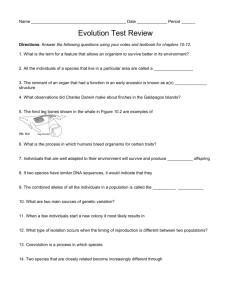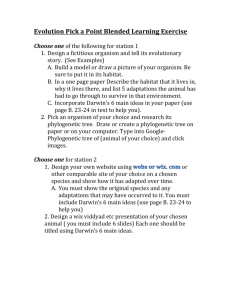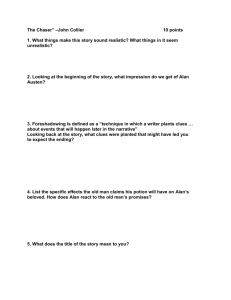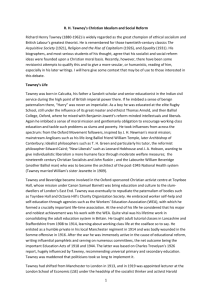File - My E
advertisement
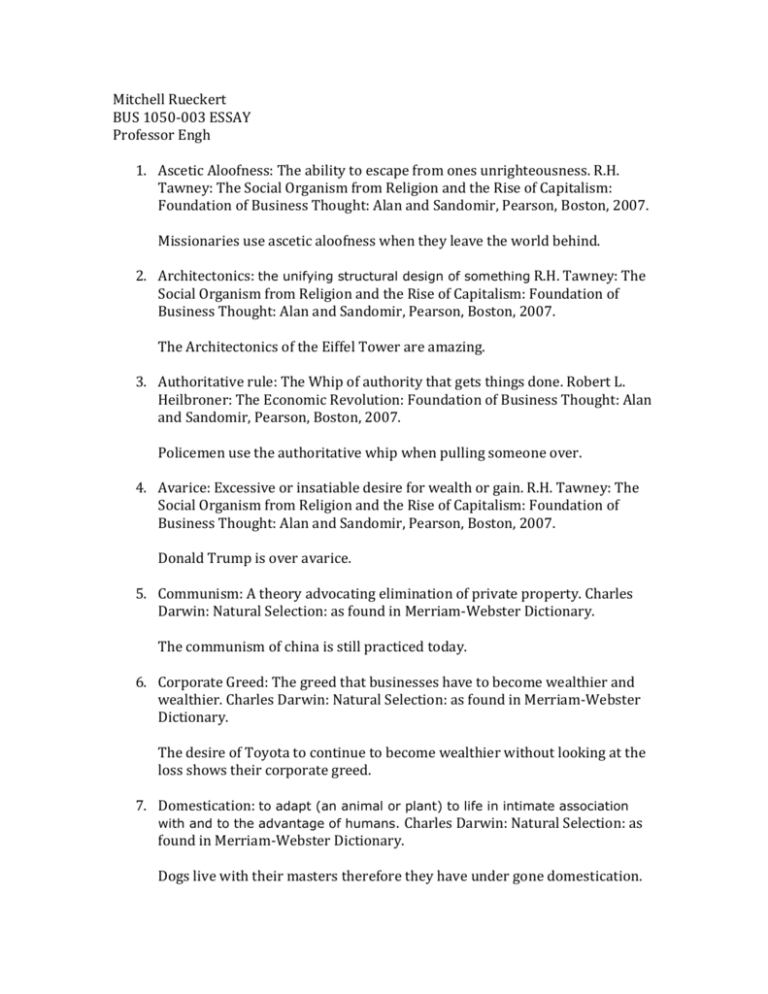
Mitchell Rueckert BUS 1050-003 ESSAY Professor Engh 1. Ascetic Aloofness: The ability to escape from ones unrighteousness. R.H. Tawney: The Social Organism from Religion and the Rise of Capitalism: Foundation of Business Thought: Alan and Sandomir, Pearson, Boston, 2007. Missionaries use ascetic aloofness when they leave the world behind. 2. Architectonics: the unifying structural design of something R.H. Tawney: The Social Organism from Religion and the Rise of Capitalism: Foundation of Business Thought: Alan and Sandomir, Pearson, Boston, 2007. The Architectonics of the Eiffel Tower are amazing. 3. Authoritative rule: The Whip of authority that gets things done. Robert L. Heilbroner: The Economic Revolution: Foundation of Business Thought: Alan and Sandomir, Pearson, Boston, 2007. Policemen use the authoritative whip when pulling someone over. 4. Avarice: Excessive or insatiable desire for wealth or gain. R.H. Tawney: The Social Organism from Religion and the Rise of Capitalism: Foundation of Business Thought: Alan and Sandomir, Pearson, Boston, 2007. Donald Trump is over avarice. 5. Communism: A theory advocating elimination of private property. Charles Darwin: Natural Selection: as found in Merriam-Webster Dictionary. The communism of china is still practiced today. 6. Corporate Greed: The greed that businesses have to become wealthier and wealthier. Charles Darwin: Natural Selection: as found in Merriam-Webster Dictionary. The desire of Toyota to continue to become wealthier without looking at the loss shows their corporate greed. 7. Domestication: to adapt (an animal or plant) to life in intimate association with and to the advantage of humans. Charles Darwin: Natural Selection: as found in Merriam-Webster Dictionary. Dogs live with their masters therefore they have under gone domestication. 8. Economic Revolution: The massive change in the economy that lead to many great things. The major changes in agriculture throughout the 18th and 19th centuries. 9. Equilibrium: a state of adjustment between opposing or divergent influences or elements: Charles Darwin: Natural Selection From the Origin of Species: as found in Merriam-Webster’s dictionary. In Marketing we can use the point of equilibrium to find our break even point. 10. Indifferentism: Belief that all religions are equally valid. R.H. Tawney: The Social Organism from Religion and the Rise of Capitalism: Foundation of Business Thought: Alan and Sandomir, Pearson, Boston, 2007. Most of the world practices indifferentism. 11. Industrial Revolution: The change in the industries, change to mass production. R.H. Tawney: The Social Organism from Religion and the Rise of Capitalism: Foundation of Business Thought: Alan and Sandomir, Pearson, Boston, 2007. The change in agriculture in the 18th and 19th centuries. 12. Market System: Each should do what was to his best monetary advantage. Robert L. Heilbroner: Foundation of Business Thought: Alan and Sandomir, Pearson, Boston, 2007. Companies in the world today must use the marketing system or they will fail. 13. Monasticism: Of or relating to monasteries or to monks or nuns. R.H. Tawney: The Social Organism from Religion and the Rise of Capitalism: Foundation of Business Thought: Alan and Sandomir, Pearson, Boston, 2007. Many people practice Monasticism to separate themselves from the world. 14. Natural Selection: it is a power compared with mans selection. Charles Darwin: Natural Selection From the Origin of Species: as found in Mariam Natural Selection shows the way we have changed through out time to become better, 15. Quietism: A passive or withdrawn attitude. R.H. Tawney: The Social Organism from Religion and the Rise of Capitalism: Foundation of Business Thought: Alan and Sandomir, Pearson, Boston, 2007. Many when angered use quietism as their way of coping. 16. Remuneration: recompense, pay back: Charles Darwin: Natural Selection From the Origin of Species: as found in Merriam-Webster’s dictionary. The Remuneration is too great he will never remunerate us. 17. Renunciation: the act or practice of renouncing: R.H. Tawney: The Social Organism from Religion and the Rise of Capitalism: Foundation of Business Thought: Alan and Sandomir, Pearson, Boston, 2007. The government sends out renunciation for the things they say. 18. Repudiation: The refusal of public authorities to acknowledge or pay a debt. R.H. Tawney: The Social Organism from Religion and the Rise of Capitalism: Foundation of Business Thought: Alan and Sandomir, Pearson, Boston, 2007. Criminals repudiate their fines after committing a crime. 19. Socialism: A system of society or group living in which there is no private property. Charles Darwin: Natural Selection: as found in Merriam Webster dictionary. Socialism is the middle ground of many governments. 20. The Moral Law: Causes people to be in complete accord with their ruler, so that they will follow him regardless of their lives, undismayed by any anger: Sun Tzu: The Art of War: Foundation of Business Thought: Alan and Sandomir, Pearson, Boston, 2007. Religions use the moral law to control their followers. 21. The Profit Motive: individuals being provided incentive to relinquish something. Type One Error: There is something there but you fail to notice it. Edward Engh. Thinking. A spider bit me because I committed a type one error. 22. Type Two Error: You think that something is there but there really isn’t. Edward Engh. Thinking. My phone vibrated, no it didn’t I was only imagining. 23. Usury: the lending of money with an interest charge for its use; especially: the lending of money at exorbitant interest rates, Thomas Aquinas: Of the Sin of Usury: Foundation of Business Thought: Alan and Sandomir, Pearson, Boston, 2007. The credit unions offer loans for cars and houses these are types of usury. 24. Variation: divergence in the structural or functional characteristics of an organism from the species or population norm or average, Charles Darwin: Natural Selection From the Origin of Species: as found in Merriam-Webster’s dictionary. The variation of birds is remarkable.
